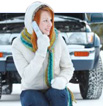
When driving in winter, itís always smart to be prepared for any weather conditions so that you are doing everything you can to prevent an accident. But if you were to be involved in a collision, would you know what to do?
First things first ó stay safe
Being in an accident ó even a fender bender ó can be a highly stressful situation. Knowing what you need to do can help to alleviate some of the tension and prevent unnecessary confusion.
If you are involved in an accident, there are certain circumstances in which you must call the police. If the accident is an emergency, call 911. Also call police if:
- Someone appears to be injured;
- There is property damage that appears to be greater in value than $1,000, or if the car isnít drivable;
- One of the drivers has potentially been involved in a criminal offence such as driving a stolen vehicle or drunk driving;
- The accident involves a transit or a federal or provincial vehicle or a vehicle transporting dangerous goods; or
- One of the parties isnít insured or their licence is under suspension.
If the accident is less serious, depending on where you live, you may be required to call the local police or go to a collision reporting centre (in many Ontario cities).
While you are waiting for the police or a tow truck to arrive, you may want to move your car to the side of the road, out of traffic, if it is safe to do so. If you canít move the vehicle, itís a good idea to turn on the hazard lights, or use orange cones, warning triangles or flares if you have them.
When the police arrive, youíre obliged to answer their questions honestly.
Collect information
You may also want to report the incident to your insurer as soon as youíve called the police. Itís crucial that you exchange the appropriate information with the other driver so you will be able to complete your claim. You will need to record the other driverís:
- Name
- Address
- Phone number
- Licence plate number
- Driverís licence number
- Vehicle description
- Insurance company and policy number
You should also consider collecting the name, address and phone number of anyone who saw the accident but was not involved.
Make a note of any pertinent details, such as the time and place of the incident, the speed of your vehicle and the weather and road conditions.
If possible, consider taking a photo of the scene, or make a quick sketch noting the position and direction of the vehicles and the cross streets.
Generally, itís a good idea to keep some key information in the glove compartment, just in case. For example, you may want to write down the number of your local and provincial police; if your cell phone doesnít have a camera, it may help to keep a disposable one in your glove compartment; you may also want to download a copy of the Insurance Bureau of Canadaís Accident Report Form to keep in the car, along with a spare pen or pencil.
What to expect from an insurer
A claims advisor should explain your existing coverage and arrange for a tow truck if you need one. He or she may also let you know whether you need to go to a collision reporting centre (and if so, where the nearest one is located). You should also be able to ask the claims advisor to help arrange for a rental vehicle if you need one, or contact your friends or family if you are unable to call them yourself.
When considering an insurance company, make sure that you know your insurer is available when you need help, and there to help you get back on track quickly.
Learn more about auto insurance, or talk to your RBC Advisor and get a General Insurance Needs Assessment.
|